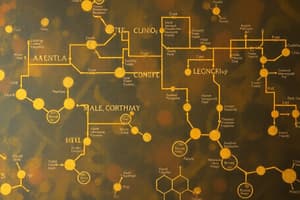Podcast
Questions and Answers
What is the primary function of catabolism in biochemistry?
What is the primary function of catabolism in biochemistry?
- Building complex molecules from simpler ones
- Facilitating cellular signaling pathways
- Extracting energy from complex molecules (correct)
- Regulating enzyme activity in cells
Which process uses energy stored in ATP to build complex molecules from simpler ones?
Which process uses energy stored in ATP to build complex molecules from simpler ones?
- Catabolism
- Gluconeogenesis
- Cellular respiration
- Anabolism (correct)
What is the main function of enzymes in biochemical reactions?
What is the main function of enzymes in biochemical reactions?
- Facilitate the breakdown of ATP
- Stop cellular signaling pathways
- Decelerate chemical reactions
- Speed up chemical reactions (correct)
How do cells regulate enzyme activity to ensure proper balance and efficiency?
How do cells regulate enzyme activity to ensure proper balance and efficiency?
Which field benefits from biochemistry by understanding disease processes and developing new drugs?
Which field benefits from biochemistry by understanding disease processes and developing new drugs?
What aspect of genetics involves studying chemical modifications to DNA and histone proteins?
What aspect of genetics involves studying chemical modifications to DNA and histone proteins?
What is the main focus of biochemistry?
What is the main focus of biochemistry?
Which biomolecule serves as energy sources and structural components of cells?
Which biomolecule serves as energy sources and structural components of cells?
What is the function of lipids in living organisms?
What is the function of lipids in living organisms?
Which biomolecule carries genetic information and facilitates protein synthesis?
Which biomolecule carries genetic information and facilitates protein synthesis?
What is the primary role of metabolism in living organisms?
What is the primary role of metabolism in living organisms?
Which term refers to the sum of all chemical reactions in living organisms?
Which term refers to the sum of all chemical reactions in living organisms?
Flashcards are hidden until you start studying
Study Notes
Uncovering the Intricate World of Biochemistry
Biochemistry, a crossroads of chemistry and biology, dives into the chemical processes within living organisms. It's a field that seeks to understand the complex dance of molecules and their interactions, which drive life and govern the inner workings of cells. Let's delve into some key aspects of biochemistry that have transformed our understanding of life at its most fundamental level.
Molecules of Life
Biochemistry focuses on the four major classes of biomolecules:
- Carbohydrates: These are sugars, like glucose, fructose, and cellulose, that serve as energy sources and structural components of cells.
- Lipids: These are fats, including triglycerides, phospholipids, and sterols, which store energy, insulate cells, and form structural components like cell membranes.
- Proteins: These are long chains of amino acids that fold into unique three-dimensional structures, forming enzymes, receptors, and other essential cellular components.
- Nucleic acids: These are the deoxyribonucleic acid (DNA) and ribonucleic acid (RNA) molecules that carry genetic information and facilitate the synthesis of proteins.
Metabolism
Metabolism, the sum of all chemical reactions in living organisms, is a cornerstone of biochemistry. Metabolism helps maintain life by breaking down molecules for energy and building new ones as needed. It can be divided into two broad categories: catabolism and anabolism.
- Catabolism: This process breaks down complex molecules to retrieve energy and release products. The most familiar example is cellular respiration, which extracts energy from glucose to produce ATP (adenosine triphosphate), the cell's energy currency.
- Anabolism: This process builds complex molecules from simpler ones, using energy stored in ATP. Examples include gluconeogenesis, the synthesis of glucose from non-carbohydrate sources, and protein synthesis, where amino acids are assembled into proteins.
Enzymes and Regulation
Enzymes are biological catalysts that accelerate chemical reactions, enabling cells to carry out their metabolic processes and regulatory functions. These proteins are highly specific, each catalyzing a single reaction or a small set of related reactions.
Regulation is a critical aspect of biochemistry, ensuring the proper balance and efficiency of cellular processes. Cells regulate enzyme activity through various mechanisms, including the production of specific enzymes, enzyme modification, and allosteric regulation, where enzymes' activity is altered in response to changes in their structure.
Cellular Signaling
Cellular signaling, also known as molecular signaling, is an essential aspect of biochemistry that allows cells to communicate and coordinate activities. Signal transduction pathways convey a signal from the cell surface to the nucleus, allowing cells to respond to their environment and adapt to changing conditions.
Genetics and Epigenetics
Biochemistry's relationship with genetics and epigenetics is a testament to the field's interdisciplinary nature. DNA carries the genetic information that directs protein synthesis and cellular processes. Epigenetics, the study of chemical modifications to DNA and histone proteins, helps regulate gene expression and influence an organism's phenotype.
Biochemistry in Practice
Biochemistry has numerous applications in fields like medicine, food science, and environmental science. For example:
- In medicine, biochemistry informs the development of new drugs, the study of disease processes, and the understanding of metabolic disorders.
- In food science, biochemistry helps identify the nutritional value of food, understand food production and preservation methods, and develop new food products.
- In environmental science, biochemistry helps understand the interactions between organisms, pollutants, and the environment, and provides tools and strategies for environmental remediation.
In conclusion, biochemistry is a complex and multifaceted field that offers a fascinating glimpse into the molecular workings of life. By understanding the science of biochemistry, we can appreciate the intricate dance of molecules that underlies the fundamental processes driving life.
Studying That Suits You
Use AI to generate personalized quizzes and flashcards to suit your learning preferences.




